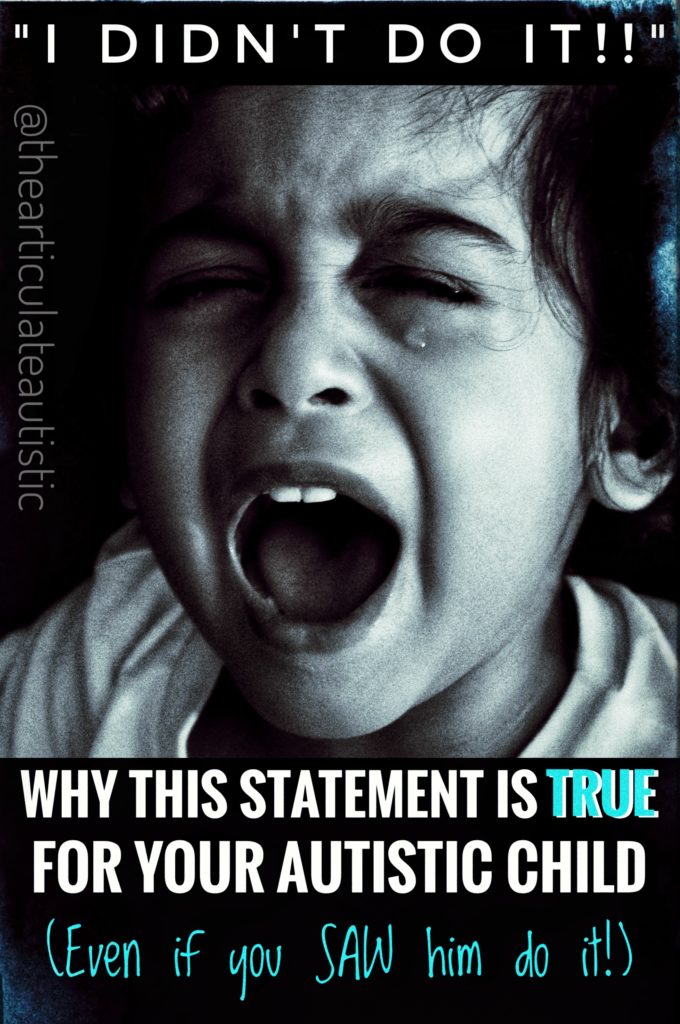“I Didn’t Do It!” – What Your Autistic Child Might Really Mean When Saying This

If you’re the parent of a speaking autistic child, you’ve probably heard “I didn’t do it!” more times than you can count. What you may not understand is why they’re insisting they didn’t do whatever it is you’re saying they’ve done when you just saw them do it with your own two eyes!
You’ve probably heard that autistic and otherwise neurodivergent people don’t lie often, and, when we do, it’s usually because we are trying to save our lives or sanity or prevent ourselves from being attacked by neurotypical people misunderstanding our intentions.
So, if your kid doesn’t usually lie, but he’s emphatically denying something he clearly just did with tears streaming down his face, WHAT is going on?
Believe it or not, that’s an easy question to answer:
He didn’t do it.
Allow me to explain.
Yes, you saw him run through the room, yes, you saw his elbow smack into the photograph at the edge of the table, yes, you saw it crash to the floor and break into tiny pieces. But, to him, he didn’t do it.
What does he mean? He didn’t do it on purpose.

I’ve talked about this many times before about how many autistic people better understand behavior, reactions, and consequences based on intentions, not actions.
So, if young Pete came careening down the hallway to escape a sudden noise (say, a buzzer on the dryer to indicate the clothes were done) that’s causing him sensory overload, the only thing that is on that child’s mind is to escape the sound at all costs.
It’s what his entire body and brain are screaming at him. There is nothing else. There’s no house, no table, no floor, no photograph, no glass all over the place. There is only fight-or-flight terror and pain.
So, if you were to come up behind him in this state and yell at him for his “carelessness” in knocking over the photograph, you’re likely to get an, “I didn’t do it” because, at that moment of an impending meltdown, he probably doesn’t even realize he did anything at all!
Think about the last time your adrenaline was pumping because you were working out, hiking, or moving furniture, and you only noticed a small scratch or a bruise afterward on your body when the adrenaline wore off.
You have no idea how the scratch or bruise happened, you have no memory of what you did because, at the time, there was no pain.
It’s the same with your autistic loved one. In fight-or-flight, you only know to run, escape, fight, flee, or freeze. You only know to survive. The idea of knocking over a photo frame or Grandma’s heirloom vase in the process of escaping the offending sensory input just doesn’t compute.
Therefore, in the aftermath of a meltdown, your autistic loved one may genuinely not make the connection between the broken photo frame on the floor and their flailing limb as having caused it.
This can also be the case when a social mistake occurs. Maybe your autistic loved one spoke in a way that was perceived as too blunt to the neurotypical people around her.
You say, “Jenny, you hurt Grandma’s feelings.” Jenny says, “I didn’t do it!” Because she had no intention of doing it and has absolutely no idea what you’re talking about.
Please keep this in mind the next time your autistic loved one says, “I didn’t do it”. In their mind, they genuinely didn’t do anything wrong, and they don’t understand why they’re being reprimanded. They’re not lying to you or trying to get out of something, they’re just experiencing events differently from you.
In their minds, they didn’t do it, but you’re yelling at them anyway, and they are breathlessly trying to defend themselves as if their life depends on it, because, in a way, it does.
The Takeaway
Believe we had no intention of causing any harm and may not even remember what we knocked over or said that you perceived as offensive. This is why it’s so important to reassure us in these moments, and, only when we feel safe and reassured, should you explain what happened (never assume we remember or know what you’re talking about) in detail, why it is perceived as wrong or inappropriate, what feelings you have about what happened, and what we can do to make things right and why we should make it right (give logical, concrete explanations).
For example:
Your autistic son, desperate to escape an offending noise, runs into the room at full speed, knocking over a fragile glass photo frame in the process.
- Check if he’s OK. Comfort him, reassure him, help him emotionally regulate first. Keep him away from the broken glass or anything else that might hurt him, but don’t bring up the broken glass photo frame at all.
- Once he is calm, safe, and secure, safely remove and dispose of whatever has been broken.
- Explain to him that in his flight, he accidentally knocked over a glass photo frame, show him the photo that used to be in it, and point out exactly where it used to be (he may never have noticed it before).
- Reassure him that he’s OK and that you love him and you’re not angry. Talk about maybe going shopping for a new one, a sturdier one, that won’t break as easily, and talk about maybe putting it up higher and out of reach.
As an autistic adult who was endlessly chastised for running into things, breaking things, saying the wrong thing, doing the wrong thing, not picking up on hints, not understanding social rules, etc., I can tell you with absolute certainty that doing this to your autistic loved one will cause them PTSD and/or other lasting mental health problems in the future.
Believe our intentions, not our actions. Comfort us, reassure us, explain, give context, and teach. Be patient. “I didn’t do it”, and “I didn’t intend to do it” often mean the exact same thing to us. Bear that in mind.
Want downloadable, PDF-format copies of these blog posts to print and use with your loved ones or small class? Click here to become a Patreon supporter!




How would you get them to recognize the action? I say this because AT SOME POINT they won’t be living in the same house or will be at work, etc and while accidents happen, taking responsibility is a social skill that non-family/loved ones will expect from him, or otherwise reject him over. Yes I see that it opens them up to being gaslighted (“Don’t worry about it. We’ll tell Jerry he did it, he will have to believe us. He can clean that crap up for us later”). But how do we get them to trust us then help clean it up or apologize? With us the only way is to just say “You know what, I made a mistake. You didn’t do it, and I have no idea how grape juice got on you and the floor and couch. It was my fault for putting it right next to me and only saying 5 times ‘stop stop stop! Don’t push on that table! I shouldn’t have caused that to happen, I’m sorry.”
I am 100% empathetic and I don’t care about what broke etc or what was spilled that I am being yelled at because it’s my fault and I really understand. But again, at some point, that happens when he’s NOT in my home with less than understanding people and the social norm is to 1) admit fault/appologize and 2) offer to clean up or make it right.
How can we get to a point to teach that while NOT implying wrong intent or displeasure with him?
That’s a tough one. Thank you for your question. It sounds like your child genuinely doesn’t understand that he did it. Saying something like, “You’re right, I did it”, isn’t fair to either one of you. One, it sounds pretty condescending (even if you don’t mean it that way), and it’s also going to cause understandable resentment on your part. You shouldn’t have to take the blame for something you didn’t do, plus, that’s confusing for your son. I’d have to know a bit more about your son to understand. What are his verbal skills? Does he communicate better through a device? How does he understand cause and effect? I’d like to help you further. Feel free to email me at jaimeheidel@gmail.com.
Thank you for posting this insightful article!
What about an autistic child who denies doing things they did while calm? For example, you watch her pick up a drawing and look at it. You tell her to stop looking at the drawing and put her shoes on because it’s time to go. She says she wasn’t looking at the drawing and sticks to that no matter what. Another time, she stops brushing her teeth and just stands there with the toothbrush in her mouth, still, not moving it. You ask her to keep brushing. She insists she never stopped brushing. You see her accidentally knock something over while reaching for something. Again, she’s perfectly calm, not escaping sensory overload or anything like that. You ask her to pick it up and she insists she didn’t knock it over. Imagine all of that happened in a 30-minute period and frequently happens. How do you understand and deal with that?
Well, first I would look into absence seizures and make sure she isn’t having them. Talk with her pediatrician about that. Second, if it’s not absence seizures, she may be taking ‘sensory breaks’ where her brain causes her to zone out for a few moments because, even if she’s calm, and the situation is calm, simply existing as an autistic person in a neurotypical world is exhausting, so her brain may be building in these “breaks” to cope. She may genuinely not be aware she’s doing it. It sounds like she may have difficulty with working memory and executive function. Meaning, she may literally not remember doing something the second after she’s done it or even when she’s doing it. I would recommend looking into Tera Sumpter’s work for more on this: https://www.instagram.com/terasumpter_slp. She’s a speech-language pathologist who specializes in working memory and executive function challenges in autistic children. But, again, please take her to her pediatrician to rule out absence seizures. That is important.